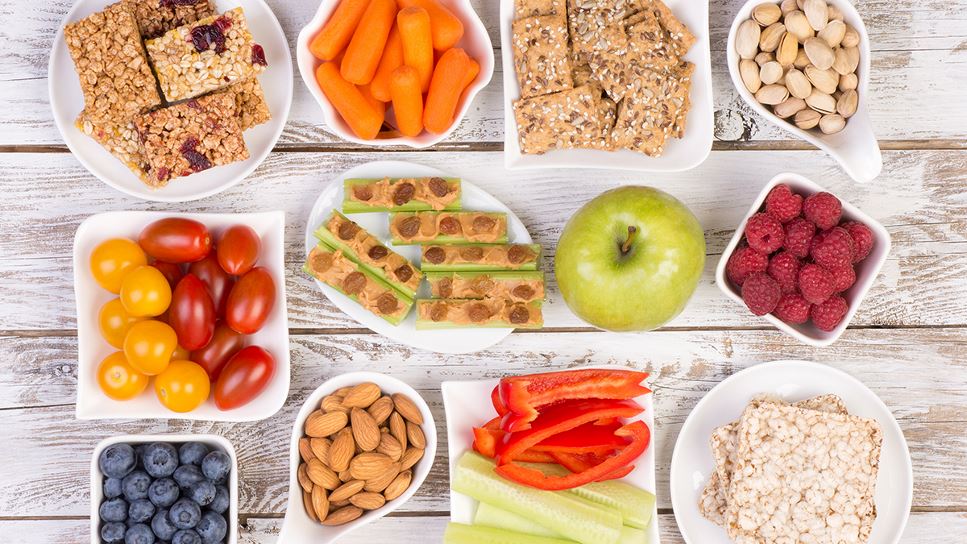Does it seem like it's always snack time? Many children graze throughout the day enjoying a never-ending snack time. Snacks are good for kids because they help them stay focused at school and on homework, give them needed nutrients and keep hunger at bay. To lots of kids and teens, a snack is a bag of chips, some cookies or some other low-nutrient food. Instead, think of snacks as mini-meals.
Unplanned, random snacking can lead to problems. Nonstop snacking interferes with kids' appetites and can disrupt their natural instinct to experience hunger and fullness. When timed correctly, snacks can help kids get the energy and nutrients they need.
When Should Kids Snack?
Most children and teens need to eat every three to four hours throughout the day to fuel their growing, active bodies and meet their MyPlate daily food plan. This translates into the following:
- Younger kids need to eat three meals and at least two snacks a day.
- Older kids need to eat three meals and at least one snack a day (they may need two snacks if they're going through a growth spurt or if they are very physically active).
Offer planned meals and snacks consistently throughout the day. A good rule of thumb is to offer snacks a few hours after one meal ends and about one to two hours before the next meal begins. Postponing snacks until a few hours after a meal helps prevent kids from refusing food at a meal and then begging for more food as a "snack" just after the meal ends. On the other hand, putting a stop to snacking immediately before meals encourages a healthy appetite at mealtimes.
Where Should Kids Snack?
When at home, designate a certain area as the "eating-only zone'' and limit all snacking to that location. The kitchen table or countertop works well. When kids snack all over the house, that makes it hard for you to know what and how much they're eating. (Plus, all the crumbs and spills can get messy!) Also, never let kids eat snacks while watching TV. Studies show that this mindless munching leads to overeating.
Be a Smart Snacker
The following strategies will make you and your family smart snackers:
- Expect smaller children to eat smaller portions. Young children may need more frequent snacks than older kids because little ones have smaller stomachs that hold less.
- Offer meals and snacks at predictable times.
- Be prepared for hungry tummies at predictable snack times. This might mean your kids are extra hungry right after school.
- To make sure your kids eat at mealtimes, don't offer snacks too close to a meal.
- Offer nutrient-dense foods that are otherwise lacking in the diet and will improve your child's nutrient intake.
- Place produce in plain sight. Keep a bowl of fresh, just ripe whole fruit in the center of your kitchen or dining table. Keep small containers of fresh veggie snacks (carrots, celery sticks and broccoli florets) at kids-eye level in the fridge.
- Stock your pantry with canned snacks such as fruits canned in juice or natural applesauce made without added sugar. Divide larger cans into smaller portions in reusable containers or buy the convenient single-serve container.
- Cut snacking costs with frozen fruits as they often are less expensive but just as nutritious as the fresh varieties. Purchase frozen strawberries, raspberries and blueberries in large bags; then, use small handfuls for yogurt toppings or as smoothie ingredients.
- Offer your kids a snack containing protein and fiber, so the snacks are filling, sustaining and add to the quality of the diet. Try some of these combinations:
- Trail mix: nuts, dried fruit without added sugars, whole-grain pretzels and low-sugar dry cereal
- Low-fat cheese and pear slices
- Reduced-sodium sliced turkey breast wrapped around apple slices
- Low-fat yogurt, fruit and nuts
- Nuts and raisins
- Celery sticks filled with almond butter and sprinkled with dried cranberries and chopped pistachios
- Baked tortilla chips dipped in salsa
- Roasted chickpeas
Jodie (Jo Ellen) Shield, MED, RD, LD, is co-author of Healthy Eating, Healthy Weight for Kids and Teens from the Academy of Nutrition and Dietetics.
Find a Nutrition Expert
Looking for credible nutrition information and recommendations? The Academy of Nutrition and Dietetics' network of credentialed food and nutrition practitioners are ready to help!

